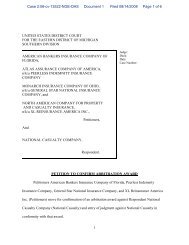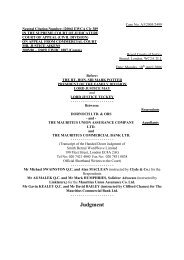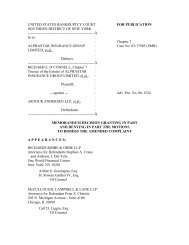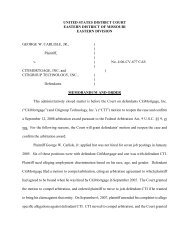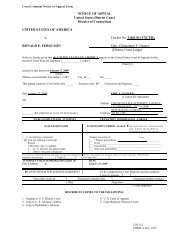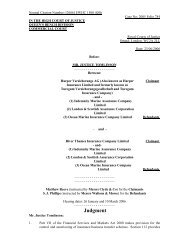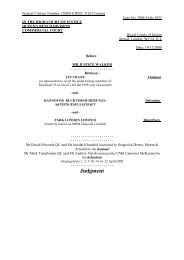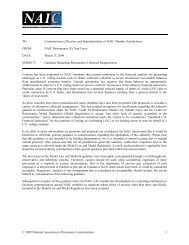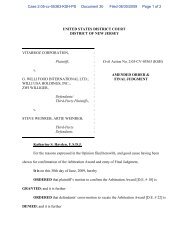Statutory Issue Paper No62R - Reinsurance Focus
Statutory Issue Paper No62R - Reinsurance Focus
Statutory Issue Paper No62R - Reinsurance Focus
You also want an ePaper? Increase the reach of your titles
YUMPU automatically turns print PDFs into web optimized ePapers that Google loves.
SSAP No. 62R<br />
Statement of <strong>Statutory</strong> Accounting Principles<br />
26. Q: A reinsurance contract is entered into after the contract’s effective date. Is the coverage<br />
between the contract’s effective date and the date the contract was entered into<br />
prospective or retroactive?<br />
A: The portion of the contract related to the period of time between the effective date of the<br />
contract and the date the contract was entered into is retroactive because it covers<br />
insured events that occurred prior to entering into the reinsurance contract.<br />
27. Q: How is the date the reinsurance contract was entered into determined?<br />
A: It is not uncommon for a reinsurance arrangement to be initiated before the beginning of<br />
a policy period but not finalized until after the policy period begins. Whether there was<br />
agreement in principle at the beginning of the policy period and, therefore, the contract<br />
is substantively prospective must be determined based on the facts and circumstances.<br />
For example, a contract may be considered to have been substantively entered into even<br />
though regulatory approval of that contract has not taken place.<br />
The absence of agreement on significant terms, or the intention to establish or amend<br />
those terms at a later date based on experience or other factors, generally indicates that<br />
the parties to the contract have not entered into a reinsurance contact, but rather have<br />
agreed to enter into a reinsurance contract at a future date. If contractual provisions under<br />
a contract substantively entered into at a future date covered insurable events prior to that<br />
date, that coverage is retroactive.<br />
In any event, SSAP No. 62 provides that if a contract (except facultative contracts and<br />
contracts signed by the lead reinsurer and certain cover notes or similar documents signed<br />
by reinsurers representing more than 50% of the capacity on the contract) has not been<br />
finalized, reduced to written form and signed by the parties within 9 months after its<br />
effective date, it is presumed to be retroactive.<br />
28. Q: Are contracts to reinsure calendar-year incurred losses considered blended contracts that<br />
have both prospective and retroactive elements?<br />
A: Yes. Most reinsurance contracts covering calendar-year incurred losses combine<br />
coverage for insured events that occurred prior to entering into the reinsurance contract<br />
with coverage for future insured events and, therefore, include both prospective and<br />
retroactive elements.<br />
In any event, SSAP No. 62 provides that if a contract (except facultative contracts,<br />
contracts signed by the lead reinsurer and certain cover notes or similar documents signed<br />
by reinsurers representing more than 50% of the capacity on the contract) has not been<br />
finalized, reduced to written form and signed by the parties within 9 months after its<br />
effective date it is presumed retroactive.<br />
29. Q: When the prospective and retroactive portions of a contract are being accounted for<br />
separately, how should premiums be allocated to each portion of the contract?<br />
A: No specific method for allocating the reinsurance premiums to the risks covered by the<br />
prospective and retroactive portions of a contract is required. However, separate<br />
accounting for the prospective and retroactive portions of a contract may take place only<br />
when an allocation is practicable.<br />
© 2009 National Association of Insurance Commissioners 62-30


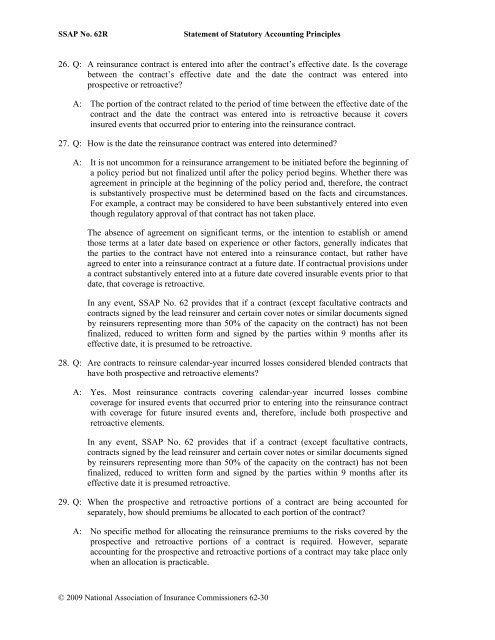
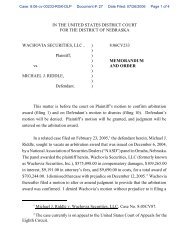
![202 Folio No 734 Neutral Citation Number: [2006] EWHC 1345 (QB ...](https://img.yumpu.com/50015000/1/184x260/202-folio-no-734-neutral-citation-number-2006-ewhc-1345-qb-.jpg?quality=85)
